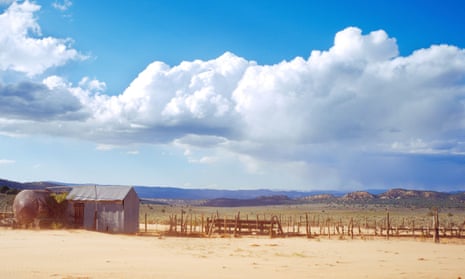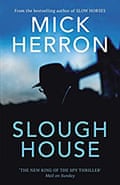
Mick Herron’s acclaimed spy-cum-political-satire series now stands at seven novels; the latest, Slough House (John Murray, £14.99), is named after the dilapidated building to which failed spies are consigned. Condemned to boring and thankless tasks under the sardonic auspices of the repulsive and increasingly cartoonish Jackson Lamb, in this instalment the “slow horses” are alarmed to discover that not only have their details been wiped from the spooks database, several of their number have met their deaths in ways that may not be as accidental as they appear. Meanwhile, at the Regent’s Park HQ, chief Diana Taverner has been frustrated by the government’s gutless response to the novichok poisoning of a British subject. So she has made a bargain with the manipulative and – with his fluffy hair and archaic expostulations – strangely familiar Peter Judd, a former home secretary turned PR man. As the slow horses wonder whether they are being targeted, Taverner realises quite how long a spoon is needed by those who would sup with the devil … Set against a background of “You Know What” (Brexit, like Lord Voldemort, is not to be named) and yellow vest protests, Herron’s formula of misdirection and multiple viewpoints still works like a charm.
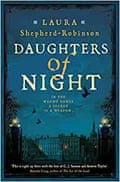
In her second novel, Daughters of Night (Mantle, £14.99), Laura Shepherd-Robinson takes a minor character from her award-winning debut Blood & Sugar, and puts her front and centre to great effect. We are in 1782 London and society beauty Caro Corsham, whose politician husband is abroad, makes a visit to the Vauxhall Pleasure Gardens, only to encounter a mortally wounded woman there. The official investigation comes to an abrupt halt when the authorities at Bow Street discover that the woman was a high-class prostitute. Despite the danger to her reputation, Caro enlists the services of former magistrate Peregrine Child – another character from Blood & Sugar – to uncover the truth. An utterly fascinating trawl through the Georgian demimonde ensues, covering everything from the bestselling directory of London sex workers, Harris’s List, to the auctioning of maidenheads, the appalling ravages of venereal disease and a lightly fictionalised version of the notorious Hellfire Club. Niftily plotted, vivid and thoroughly researched, this immersive – if wrist-spraining – 569-pager is highly recommended.
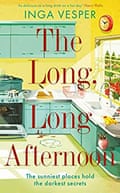
Inga Vesper’s remarkably assured debut, The Long, Long Afternoon (Manilla, £14.99), takes us into Stepford Wives territory: the California suburb of Sunnylakes in 1959, where housewives have to be tranquillised up to the eyeballs in order to bear the smallness and isolation imposed on them by the American dream. The racism is as systemic as the sexism: when Joyce Haney vanishes, leaving behind two young children and a bloodstained kitchen, the police promptly arrest her black maid, Ruby. Along with Detective Mick Blanke, recently arrived from New York and tasked with working out what happened, the two women take it in turns to narrate this tale of inequality, broken dreams and quiet desperation behind a picture-perfect facade.
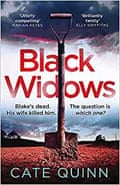
Mormon polygamist Blake Nelson and his three wives may not have a perfect life on their rundown former cattle ranch in the Utah desert but, despite being shunned by other members of the Latter-day Saints, they believe they are righteous in the sight of God. However, it’s clear from the very start of Cate Quinn’s Black Widows (Orion, £12.99) that He must have been looking the other way, because Blake has been found murdered and the police reckon that one of the three must be the culprit. Obedient senior wife Rachel, whose background is so traumatic that life on a remote smallholding with a depressive survivalist is “paradise on Earth”, has nothing in common with either naive 19-year-old Emily who self-harms or worldly ex-junkie Tina – other than their now deceased husband. The three women pass the narrative baton between them and, as the investigation proceeds, we learn about their backgrounds and their relationships with their “sister-wives”. What’s fascinating about this well-researched mystery is the window it offers on the extraordinary and disturbing world of people who believe they have found the true faith, even if the conclusion is a bit too feelgood to be entirely plausible.
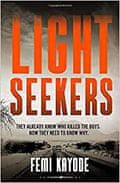
Set in and around a Nigerian university, Femi Kayode’s exciting debut, Lightseekers (Raven, £14.99), appears to be a town-and-gown mystery: three students, accused of stealing, are set upon and killed by a mob. However, when psychologist and expert in crowd behaviour Philip Taiwo is persuaded to investigate, he discovers that the reality is considerably more complicated. There is a great deal going on here – college fraternities, drugs, corruption, societal division, quite a lot of Nigerian history and an unhinged second narrator who appears occasionally in sections written in serial killer italics – and although the result is tonally uneven it is certainly gripping, with an appealing protagonist and a strong sense of place.
